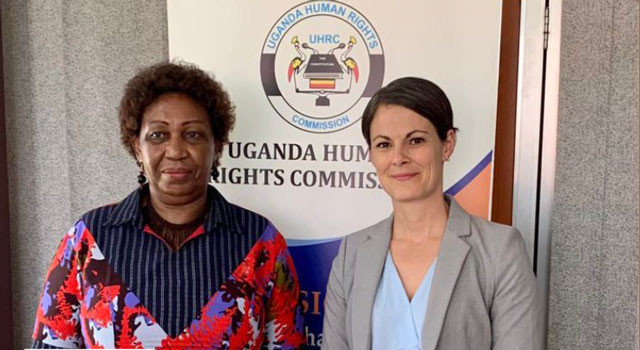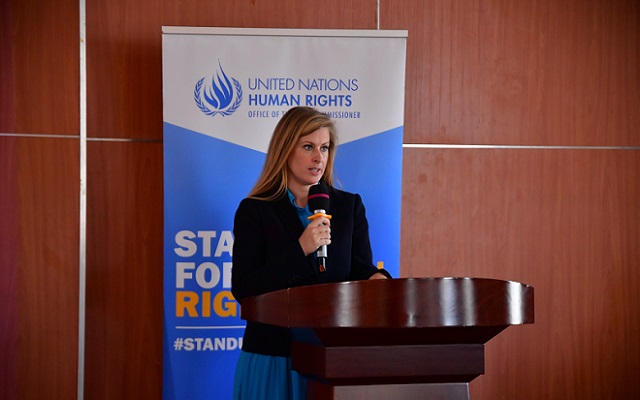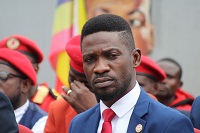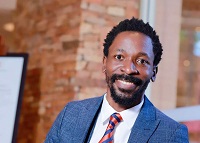
Why is Uganda on a slippery slope?
COVER STORY | THE INDEPENDENT | On Feb. 08, the government announced it was not renewing the mandate of the UN Office of Human Rights in Kampala.
The Office of the High Commissioner for Human Rights (OHCHR) is mandated to promote and protect the rights of people established in the Charter of the United Nations and in international human rights laws and treaties.
The mandate includes preventing human rights violations, securing respect for all human rights, promoting international cooperation to protect human rights, coordinating related activities throughout the United Nations, and strengthening and streamlining the United Nations system in the field of human rights.
All member countries of the UN General Assembly, including Uganda, elect the members who occupy 47 seats of the UN Human Rights Council for a three year term. Uganda last sat on the council from 2011-2013.
The Human Rights Council holds no fewer than three regular sessions a year, for a total of at least ten weeks. But if one-third of the Member States requests it, the Human Rights Council can hold a special session to address human rights violations and emergencies in a specific country.
These periodic reviews are an important component of the UN Human Rights Council mandate. Each of the 193 UN member states must undergo the so-called Universal Periodic Review (UPR).
The review mechanism is based on reports coming from different sources, one of them being contributions from non-governmental organisations (NGOs) on each country’s situation.
Last year, on Nov. 10, 2022, the UN Committee against Torture (CAT) concluded its consideration of the Second Periodic Report for Uganda in Geneva, Switzerland.
The CAT is a treaty body of human rights experts that monitors implementation of the UN Convention against Torture by state parties. All UN countries must submit regular reports to the CAT on how rights are being implemented. The Office of the High Commissioner for Human Rights (OHCHR) is the depositary of all CAT reports.
During Uganda’s CAT review, Abderrazak Rouwane, Country Co-Rapporteur for Uganda and Committee Expert noted reports of the existence and use of unauthorized places of detention in Uganda, and the Internal Security Organisation (ISO) arbitrarily detaining more than 400 people, including persons accused of spying, collusion and dissent against President Yoweri Museveni, and the alleged torture of an opposition member of Parliament.
Kiryowa Kiwanuka, the Attorney General of Uganda and head of the delegation, put up a spirited defense.
“The Government does not run any ‘safehouses’ or ungazetted places of detention,” he said adding that such places of detention were run by individuals who were not affiliated to the Government.
The delegation of Uganda consisted of representatives from the Attorney General’s Office, the Ministry of Foreign Affairs, Uganda People’s Defence Forces, the Directorate of Public Prosecutions, the Commissioner of Prisons, Internal Security Organization, Uganda Police Force, Ministry of Justice and Constitutional Affairs; the Commissioner for Human Rights; and the Permanent Mission of Uganda to the United Nations Office in Geneva.
“We receive the comments made by the Committee in good faith and will work to address them,” Kiwanuka reportedly said. Kiryowa’s presentation was interrupted by protesters who invaded the session.
“Uganda is bleeding, the Attorney General is a liar,” shouted one demonstrator.

A few months later, on Feb. 08, the government announced it was not renewing the mandate of the UN Office of Human Rights. The current term of the OHCHR ends in August.
The costs of the decision
The same day, Feb.08, the U.S. Mission in Kampala released a press statement titled “Report to the Ugandan People 60th Anniversary Edition”.
The report, the 6th in a series, focused on the impact of the American government’s work in Uganda to promote economic growth, improve health and education, strengthen security, and foster democratic values.
It pointed out how through 13 U.S. government agencies that comprise the U.S. Mission in Uganda, the United States invests almost US$ 1 billion (Approx. Shs3.6 trillion) annually in Ugandan communities, largely through more than 100 implementing partners and civil society organisations.
“You may not always see our flag on large buildings or billboards, but as a result of the United States’ investment, millions of Ugandans are living healthy, learning better, earning more, and participating more fully in their communities,” U.S. Ambassador Natalie E. Brown said.
The report cited the 1.3 million HIV+ Ugandans receiving U.S.-funded ARV treatment, the United States donating more than 18 million COVID-19 vaccine doses – free of cost, and the more than 4,700 Ugandan professionals who have participated in U.S. government-supported exchange programmes.
It cited the U.S. Agency for International Development (USAID) support to 50 food-processing companies, the U.S.-supported smallholder and farmers’ groups were connected to grain traders, the government school feeding programme, and refugee markets, where they sold assorted food commodities worth nearly US$12 million (Shs44 billion).

The report also cited support to Uganda’s nature tourism and USAID’s Power Africa that added more than 140,000 electricity and renewable energy connections.
Basing on the U.S. ‘Report to the Ugandan People 60th Anniversary Edition,’ it becomes clear how much the Uganda government is dependent on international goodwill for its socio-economic development.
Uganda faces tough test
The Uganda Human Rights Commission (UHRC) is preparing for its upcoming Review in 2023 by the Sub-Committee on Accreditation of the Global Alliance of National Human Rights Institutions (GANHRI).
Currently, the UHRC has an “A” Status as National Human Rights Institution. But the UN Human Rights Council which Uganda has now booted is the secretariat of the GANHRI.
Question: Will UHRC retain its “A” status at the end of the review? What are the implications of failure to maintain the status?
Answers to these questions are not clear cut. But Uganda must brace for international censure with grave consequences.
The recent government booting of first DGF and now OHCHR sends a chilling cloud over the activities of many UN and donor programmes in Uganda. Other UN organisations that have similar agreement with the government as the booted OHCHR include the United Nations Development Programme (UNDP), the United Nations Children’s Emergency Fund (UNICEF), the United Nations High Commissioner for Refugees, the World Food Programme (WFP), the United Nations Population Fund (UNFPA), the United Nations Industrial Development Organisations (UNIDO), International Organization for Migration (IOM), the Food and Agriculture Organization (FAO), the United Nations Office of Drugs and Crime (UNODC), the United Nations Capital Development Fund (UNCDF), the World Health Organization (WHO), the United Nations Office for Project Service (UNOPS) and UN Women.
The DGF was a multi-donor facility established by eight development partners under an agreement with the government. The countries included Austria, Denmark, Ireland, the United Kingdom, The Netherlands, Norway, Sweden and the European Union. Its focus was on Deeping Democracy; Rights, Justice and Peace, and Voice and Accountability to fight corruption.
The DGF was established in 2011 and in its second phase had a budget of 102 million Euros. But on Jan. 02, 2021, President Museveni ordered the suspension of DGF activities, stating that its funds were “used to finance activities and organisations designed to subvert (the) Government under the guise of improving governance.”
President Museveni was upset that DGF had been allowed to spend its budget of £100 million (Approx. Shs500.8 billion) to operate in the country without his involvement.
Today I paid a courtesy visit to @UHRC_UGANDA to hear about their important work to protect and promote fundamental Human Rights and freedoms in Uganda for sustainable development. Work that 🇩🇰 has supported for many years. @HumanRightsDK pic.twitter.com/MybvwlGjxk
— Signe Winding Albjerg (@DKAmbUganda) January 30, 2023
Overwhelmed by negative reactions to tweet on meeting HR commission to hear about their mandate. As a diplomat I meet many state and non-state actors. All have important roles to play in society and I am open to listen. Encourage those storming me on twitter to dialogue instead.
— Signe Winding Albjerg (@DKAmbUganda) February 9, 2023
President Museveni’s closure of DGF came at the climax of the 2021 presidential, parliamentary and local government elections where he faced a stiff challenge from a debutant party, the National Unity Platform (NUP), led by Robert Sentamu Kyagulanyi aka Bobi Wine.
Museveni’s ban reportedly affected over 100 Non-Governmental Organisations. Most of these saw many of their projects come to a halt.
Some of the affected organisations included the Advocates Coalition for Development and Environment (ACODE), ActionAid International Uganda (AAIU), Africa Centre for Media Excellence (ACME), Africa Freedom of Information Centre (AFIC), African Centre for Energy and Mineral Policy (ACEMP), Akina Mama wa Afrika (AMwA), Alliance for Finance Monitoring (ACFIM), Anti-Corruption Coalition Uganda (ACCU), Center for Governance and Economic Development (CEGED), Centre for Basic Research (CBR), Civil Society Budget Advocacy Group (CSBAG), Human Rights Network for Journalists-Uganda (HRNJ-U), Institute of Parliamentary Studies (IPS), International Center for Transitional Justice (ICTJ), the Justice Centres Uganda (JCU) and more.
In February 2021 the government suffered a barrage of bad reports in the local and international media when soldiers battered journalists covering National Unity Platform (NUP) president, Robert Kyagulanyi who was delivering a petition to the Office of the High Commissioner for Human Rights (OHCHR) offices in Kololo, Kampala.
The U.S. Ambassador to Kampala, Natalie E. Brown, condemned the incident and called for a probe.” Those who violate press freedom must be held to account,” she said.
The U.N. urged the Ugandan government to immediately investigate the attack and “ensure those responsible are brought to justice.” The expulsion of DGF gave the government of Uganda equally bad press.
“We are alarmed by the decision to suspend the Democratic Governance Facility,” said Jon Temin, Director of Africa Programmes at Freedom House. “This fund is critical to the operations of many Ugandan civic organizations mandated to advance the rule of law and good governance and some government bodies, including the Uganda Human Rights Commission. Through this action, the government of Uganda is standing in the way of progress driven by Ugandans themselves.”
A few months later, on Nov. 18, 2022, the international credit rating agency Moody’s changed the outlook on the Government of Uganda to “negative from stable and affirmed the B2 long-term foreign and local-currency issuer ratings.”
The agency noted that Uganda’s Environmental, Social, And Governance Considerations (ESG) Credit Impact Score is highly negative. It said this reflected, among other items, “a weak governance profile” that exacerbates the exposure to environmental and social risks.
“Uganda has a weak governance profile score,” it said, “Uganda receives low scores on the Worldwide Governance Indicators.”
Uganda’s ratings had since improved but are again likely to take a hit with the expulsion of the UN Human Rights Office.
The result is that Uganda will be squeezed into the corner of highly risk lenders who demand high interest. President Yoweri Museveni could also be seen running from one money lending capital to another in search of badly shrinking foreign funds.
Already the voices of condemnation are rising.
‘Uganda blocks operations of UN rights office in the country’ was the headline in The Washington Post.
“The closure of the @UNHumanRightsUG office proves that [the] government has lost all sense of shame. It no longer wants any close international scrutiny of its human rights record,” tweeted Adrian Jjuuko, executive director of the Human Rights Awareness and Promotion Forum.
The social cost
In Uganda, the UN activities are implemented under the United Nations Sustainable Development Cooperation Framework (2021-2025).
In a foreword of the publication, President Yoweri Museveni, recognised the role of the UN agencies.

“The UN remains Uganda’s trusted and important partner to deliver on the aspirations of the national, regional and national commitments to deliver on the Sustainable Development Goals and leave no one behind,” he wrote, “I want to appreciate the UN’s continued support and collaboration with the Government, civil society, private sector and other stakeholders in many important areas.”
Museveni listed achieving universal access to HIV prevention, treatment, care and support, climate change, agro-industrialization, refugees, food security and nutrition, social services and protection, and civic education.
“This also comes under strong commitment and efforts to better align sectoral planning and budgeting for the NDP III, enhancing the financing landscape, addressing those most affected by the COVID-19 preventive measures, enhancing the production capacity of the nation by linking factories and industrial parks to vulnerable households, cooperatives and SACOOS among many other ongoing efforts with support of the UN,” Museveni said.
One of the major programmes of the UN is the Sustainable development Goals (SDGs). Up to US$132.9 million (Approx.490 billion) is budget to come into the economy through the SDGs. Up to US$26.8 million will go to gender issues and US$20.2 million to the fight against poverty. This means that without the UN, Uganda would have the added fiscal burden in these areas.
Other SDG areas where UN intervention is critical include capacity development/technical assistance, Convening/partnerships/knowledge sharing, data collection and analysis, and policy Advice and thought Leadership.
These UN SDG priorities are in line with the governments priorities. The number one strategic intervention of the government is “Enhancing Security, Good Governance, and the Rule of Law.”
Others are boosting Economic Recovery and Enterprise Resilience, Facilitating Economic Growth and Competitiveness, Promoting Social Development and protecting Vulnerable Communities.
According to the 2023/24 budget framework paper, the government aims to strategically “restore the balance between infrastructure and human capital development.” It aims to invest in social sectors, especially health, education, and social protection, directly address poverty and income inequality. So why would the President, fully aware of the UN’s contribution to Uganda, turn around and kick them out?
The UN Human rights mandate
The recently lapsed mandate of the Office of the UN High Commission for Human Rights (OHCHR) was agreed under a Cooperation Framework for a period of three years starting February 09, 2020.
The country office of the OHCHR was set up in 2005 to focus on the human rights situation in the conflict-affected areas of Northern and North-Eastern Uganda. In 2009, the mandate of the OHCHR was extended to cover the entire country and all human rights issues.
The OHCHR has worked closely with the Uganda Human Rights Commission (UHRC) and the Justice, Law, and order Sector (JLOS) to build institutional capacity, databases, and train staff on business and human rights. It has trained Human Rights Defenders, supported them to create in 2017 a Women Human Rights Defenders Network.
It has supported advocacy efforts by the Coalition Against Torture (CAT), initiated the Court Martial to help reduce the backlog of cases in army courts and built police capacity in Karamoja. It has worked on the Witness and Victims Protection Bill, worked with NGO partners to secure justice for conflict-related sexual violence.; including organizing in 2018 a Forum for 68 survivors of sexual violence in Gulu, Northern Uganda.
The OHCHR has facilitated capacity-building for journalists and media professionals on human rights standards and gender-sensitive reporting and supported a review of disability legislation. It has worked with the Office of the Prime Minister, National Planning Authority, Uganda Bureau of Statistics and UHRC in implementing a human rights based approach to development at district level. It has worked with the Ministry of Health to advance SDG3 (Good health and well-being) and SDG5 (Gender Equality/reduce mother dying giving birth).
It has worked with the Ministry of Foreign Affairs and other partners in advancing a National Action Plan on Business and Human Rights, trained Inter-Ministerial Committee on Human Rights, and engaged with national and international partners on the human rights situation in Uganda.
This contribution to Uganda’s socio-economic development is lost with the closure of the UN Human Rights Office in Kampala. It is an unnecessary loss because, with the democratization of information, the UN does not have to be physically in Kampala in order to make reports on the human rights situation.
In January 2021, Bobi Wine filed an arbitrary detention complaint to the United Nations through Nigerian human rights lawyer Femi Falana. At the time, Bobi Wine’s residence in Kampala was surrounded by soldiers.
What they said:
Bobi Wine, Party President, National Unity Platform

In the face of growing international condemnation and isolation, tyrant Museveni has responded by shutting down NGOs, Facebook, DGF (Biggest donor-funded democracy programme) & declaring several internationals Persona Non-Grata or deporting them! Now he shuts down @UNHumanRightsUG
You’ll recall in the aftermath of the 2021 election and the hundreds killed or abducted by the Museveni regime, we petitioned the UN Human Rights Office & the military brutalized journalists right there. This UN Office condemned these actions. Not surprising it’s being closed!!

Nicholas Opiyo, Founder Chapter Four
The decision of the government of Uganda to decline the renewal of the @UNHumanRightsUG country mandate is unfortunate. I hope it is a misunderstanding that will be reversed.
Isaac Ssemakadde, founder of Legal Brain Trust

Given the general track record of the NRM government in both the decisions it makes and the way in which it implements them, the expulsion of @UNHumanRights is not amazing. But still we are forced to become amazed that even they don’t know when to see that they are going too far.
Livingstone Sewanyana, founder of the Foundation for Human Rights Initiative told Guardian

“The decision not to renew the mandate deprives Uganda of a critical player in the field of human rights promotion and protection.”
 The Independent Uganda: You get the Truth we Pay the Price
The Independent Uganda: You get the Truth we Pay the Price



Kiryowa Kiwanuka, the Attorney General of Uganda and head of the delegation, put up a spirited defense.
“The Government does not run any ‘safehouses’ or ungazetted places of detention,” he said adding that such places of detention were run by individuals who were not affiliated to the Government.
The delegation of Uganda consisted of representatives from the Attorney General’s Office, the Ministry of Foreign Affairs, Uganda People’s Defence Forces, the Directorate of Public Prosecutions, the Commissioner of Prisons, Internal Security Organization, Uganda Police Force, Ministry of Justice and Constitutional Affairs; the Commissioner for Human Rights; and the Permanent Mission of Uganda to the United Nations Office in Geneva.
———-
Batujooga nnyo